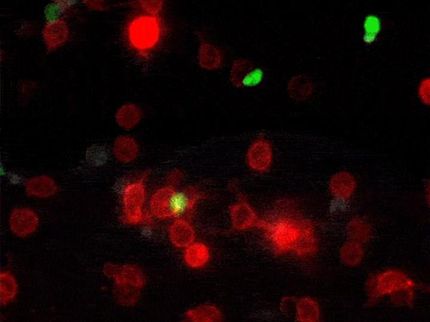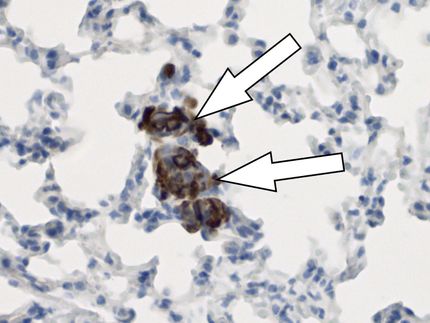The immune system's guard against cancer
Advertisement
The human body has developed various mechanisms, through which it can protect itself against newly-developing cancer cells. For instance, killer-cells recognize and destroy altered cells in our organs every day. Once tumours have developed, they may be inhibited in growth by messenger substances from the immune system. Scientists from the research group "Molecular Immunology" at the Helmholtz Center for Infection Research (HZI) in Braunschweig have now succeeded to reveal a completely unexpected function of such an immunological messenger substance in the suppression of tumours; i.e., the molecule "beta-interferon" inhibits the tumour in its attempts to connect into the human blood circulatory system. Moreover, it hinders the production of growth factors that support the formation of new blood vessels. The conclusion - the tumour cannot grow. The results from their study have been published in the Journal of Clinical Investigation.
The connection with the blood circulatory system is a significant step in the development of cancer. Within the tissue where it is growing, the tumour develops an independent existence. With signal substances it entices white blood cells from the bone marrow into the tumour tissue. The task of these cells, usually, is to defend against infection and stimulate the healing of wounds. Within the tumour, these cells prompt new blood vessels to increase their rate of growth. Once the tumour is connected to the blood circulatory system, it is provided with nutrients for growth. It also can then disseminate its own cells into the overall blood circulatory system as well and form metastases.
Scientists at the HZI are now in the process of deciphering precisely how a messenger substance is able to inhibit this integration process into the blood circulatory system.
Messenger substances are the fine-tuning regulators of immune-cells; they activate or deactivate them, generate the production of growth factors or further messenger substances and initiate or terminate an immune reaction. One of these signal molecules is currently being used in therapy for several forms of cancer -interferon. How it works remains a mystery, so far, to scientists. The research scientist Jadwiga Jablonska from HZI has recently found a new mode of action against cancer beta-interferon a subtype of the interferons. The results surprised her: "Beta-interferon blocks the connection of the tumour into the blood vessel system by inhibiting immune cells to produce growth factors. This effect upon tumours was completely unexpected," says Jadwiga Jablonska.
The research scientist allowed skin tumours to grow in two groups of mice; the first group of mice was not able to build beta-interferon, while the second group produced the messenger substance as usual within their bodies. After a few days, the research scientist investigated the growth rate of the tumour. "In mice that cannot produce beta-interferon, the tumours were considerably larger than in the animals that did have the signal molecule in their bodies." With beta-interferon, the tumours not only grew slower – they formed fewer and smaller metastases as well.
The reason for the inferior rate of growth was found by the research scientist to be attributable to the lack of blood circulation within the tumours. "In the presence of beta-interferon, considerably fewer blood vessels developed within the tumour", says Jadwiga Jablonska. The beta-interferon functioned through a small detour; it blocked the formation of vessel producing growth factors in cells that were enticed by the tumour to promote the connection with the blood-circulatory system. The research scientist discovered that the cells not only formed fewer growth factors, a smaller quantity of these cells found their way into the tumour, as well. "Only a negligible quantity of this messenger substance was sufficient to keep cells at bay and to inhibit growth factors, thus arresting the growth of tumours", says Jadwiga Jablonska.
"This mode of action on the part of beta-interferon had previously been unidentified", says Siegfried Weiss, leader of the working group "Molecular Immunology" at HZI. The messenger substance actually plays a significant role in viral diseases and reactions to infections. "We now are attempting to understand how the network of tumour, immune cells and messenger substance functions, in order to discover new target structures for cancer therapy", says Weiss.
Original publication: Jablonska J, Leschner S, Westphal K, Lienenklaus S, Weiss S.; "Neutrophils responsive to endogenous IFN-beta regulate tumor angiogenesis and growth in a mouse tumor model."; J Clin Invest. 2010.




























































